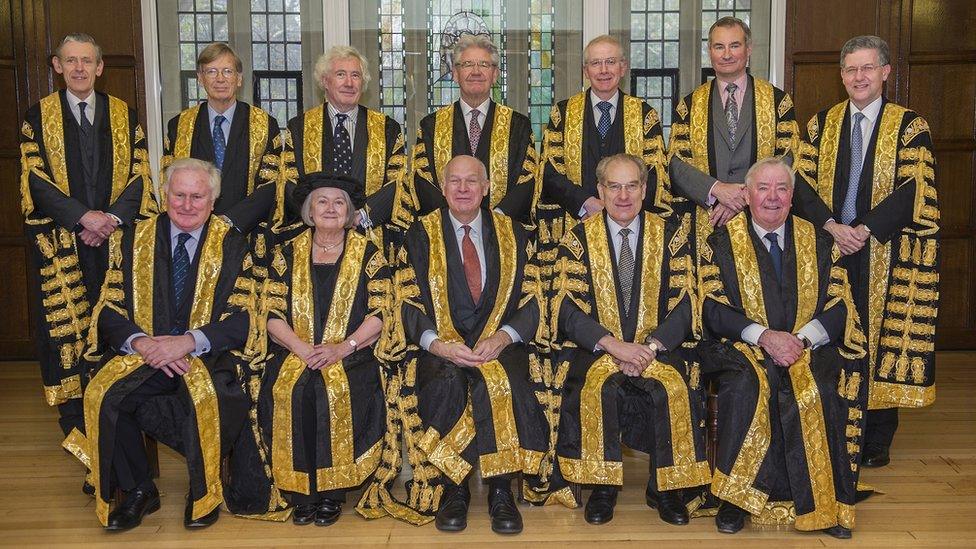Supreme Court Brexit case: 'No need' for MPs to get final say
- Published
- comments
What is Supreme Court Brexit case all about?
The government has urged the Supreme Court to make a decision the "ordinary man and woman" would understand in the landmark legal challenge over Brexit.
Government lawyer James Eadie QC said ministers could trigger Brexit and that there was no basis for Parliament to get the final say.
He faced a grilling from the 11 Supreme Court justices as he set out his case.
The government is appealing after last month's High Court ruling that MPs must be consulted before triggering Brexit.
There were queues going into the courtroom and protesters outside on day one of the hearing, which is expected to last four days, with a verdict due in January.
The outcome of the hearings, which resule at 10:15 GMT on Tuesday, will have implications for Theresa May's strategy for EU exit, but it is not a court case on whether or not Brexit actually takes place.
In the first day at the Supreme Court:
Court president Lord Neuberger said the judges would consider issues impartially and decide the case according to the law
The government set out why it thinks it should be able to use "prerogative powers" to trigger Brexit
Ministers have the power to make or unmake treaties, it said
It said the powers were not a "relic" but a key part of the constitution
Parliament could have chosen to restrict ministers' power to act but had chosen not to, it said
Mr Eadie said Parliament had "carefully selected" which areas it wanted to control, and that where it had not, executive power should apply
At the start of the hearing, Supreme Court president Lord Neuberger said the justices were aware of the public interest in the case and the "strong feelings associated with the many wider political questions surrounding the United Kingdom's departure from the European Union".
But he added: "This appeal is concerned with legal issues, and, as judges, our duty is to consider those issues impartially, and to decide the case according to the law."
He also said some of the people involved in the case had received "threats of serious violence and unpleasant abuse in emails and other electronic communications", warning anyone that such behaviour "undermines the rule of law".

Analysis

By Dominic Casciani, BBC Home Affairs Correspondent
Today was exactly the kind of scenario that the Supreme Court was set up to answer: the biggest question of the day - if not decades.
Inside court one, we had the unprecedented scene of 11 justices and some of the beefiest legal teams in the country.
Proceedings were, like many Supreme Court hearings, an intellectual contest conducted with warmth, civility and good humour - an examination of what the UK's uncodified constitution means.
Outside it was different - protesters from both sides. Some good humoured, some not. One shouted "traitor" at Gina Miller as she left court, having exercised her legal right to challenge the government.
Who's winning? Hard to tell.
After lunch the justices gave the government team a tough time - but at this level you can't read anything into that.
That's what they are there to do: test to the limits the claims being made, define the line and uphold the rule of law that protects our democracy.

The UK voted to leave the EU, by a margin of 51.9% to 48.1%, in a referendum in June.
The prime minister has said she intends to officially notify the rest of the EU of the UK's intention to leave - beginning two years of talks over the terms of separation - using Article 50 of the Lisbon Treaty by the end of March.
But campaigners, led by investment manager Gina Miller and hairdresser Deir Dos Santos, insist that decision can be taken only by Parliament.

The points at stake
What will the Supreme Court be considering in the Article 50 case?
The case is about whether the law means that the government needs the authority of Parliament to trigger the process for the UK to leave the EU
The government argues it can start the Article 50 process using "prerogative powers", a remnant of the era of all-powerful kings and queens
Justices will be ruling on who has the legal power to change the rights of British citizens

Monday's hearing began with Attorney General Jeremy Wright setting out the government's case.
He said the "royal prerogative" powers the government wants to use to trigger Article 50 were not an "ancient relic" but a "fundamental pillar of our constitution as a sovereign state".
The government did not seek to use the prerogative "on a whim", he said.
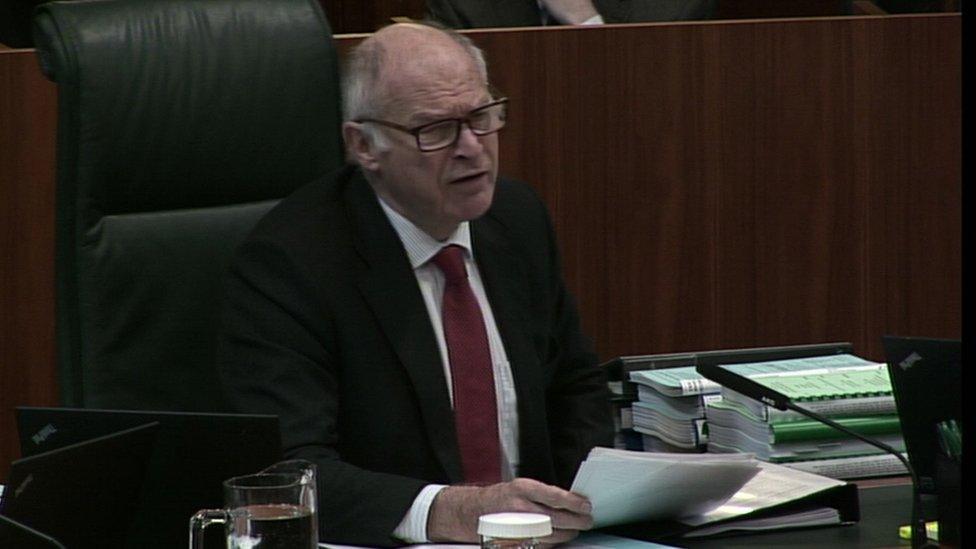
Supreme Court president Lord Neuberger said the court was aware of the public interest in the case
Mr Wright said the legislation enabling the EU referendum had been passed with the "clear expectation" that the government would implement the result, and that Parliament had had the opportunity to restrict the government's power to trigger Article 50 but had chosen not to do so.
"If this is all about standing up for Parliament, I say Parliament can stand up for itself," he said.
Taking over the case, Mr Eadie said it would be "highly improbable" for Parliament, in passing legislation enabling the EU referendum, to have been merely "reserving to itself the right to decide whether to leave or not as it saw fit".
He said the result of the referendum could not be legally "irrelevant", adding: "If you asked the ordinary man or woman on the street if they regarded the fact that a referendum has occurred as remotely relevant to the question of whether the government can give Article 50 notice, the answer would be 'Of course it is'."
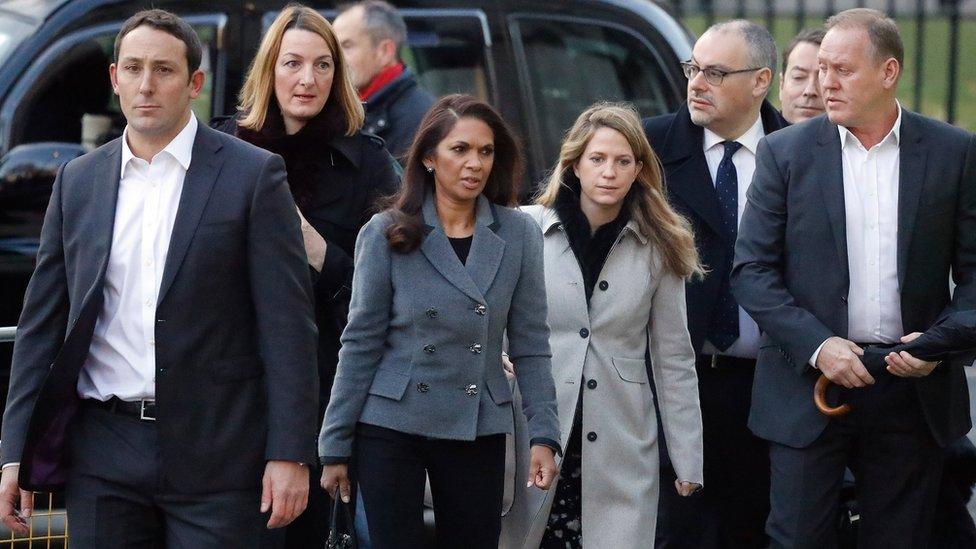
Gina Miller says she has received death threats after bringing the case
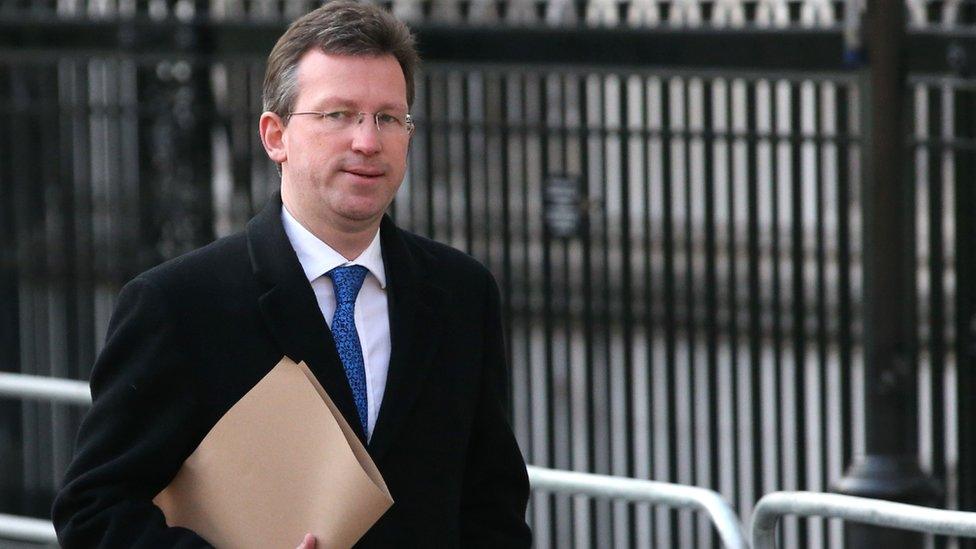
Attorney General Jeremy Wright is representing the government
Earlier this year the High Court ruled in Ms Miller's favour, arguing that rights conferred by Parliament when it passed the 1972 European Communities Act - which paved the way for the UK to join the then European Economic Community, the EU's predecessor - were likely to be affected by Brexit.
As a result, it concluded, any process leading to the potential withdrawal of rights could only be determined by Parliament.
In its judgement, external, the High Court ruled "the powerful constitutional principle that the Crown has no power to alter the law of the land by use of its prerogative powers is the product of an especially strong constitutional tradition in the UK".
The ruling led to criticism from some elements of the press and Brexit-supporting MPs, but in her submission ahead of Monday's hearing, Ms Miller said the Court had a "duty to decide questions of law".
Shami Chakrabarti tells Radio 4's Today programme we should not vilify judges
Labour has said it will try to amend an Article 50 bill - if one is required - to ensure single market access and workers' rights are protected.
Shadow attorney-general Baroness Chakrabarti told Radio 4's Today programme: "We have been completely clear that we are democrats and respect the outcome of the referendum, even though many of us - myself included - campaigned in the opposite direction."

Some protesters - and their pets - came to the Supreme Court ahead of the hearing
The Supreme Court will also consider two legal challenges to the exercise of prerogative powers brought by Northern Irish campaigners.
The Scottish and Welsh Governments have also been granted permission to intervene in the case to establish matters of important legal and constitutional principle, including the basis on which the Article 50 process might need to be sanctioned by their devolved legislatures.
Other interested parties and intervening groups - who will be making oral arguments before the court - include citizens of European Economic Area countries living in the UK known as AB parties, and Grahame Pigney's crowd-funded People's Challenge.
Ministers will have a number of options if they lose the appeal, but it has been reported that a 16-word bill is being prepared which could be fast-tracked though Parliament, asking MPs and peers "to give permission" to the government to trigger Article 50 in time to meet the March deadline.
Mrs May will be given an indication of the scale of parliamentary opposition she faces over Brexit on Wednesday, with a potential revolt over demands for the government to set out its plan for leaving the EU before triggering Article 50.
Labour will use an opposition day debate to force a vote on the issue.
BBC assistant political editor Norman Smith said up to 40 Conservatives could vote with Labour.
Ministers have refused to offer a "running commentary" on their Brexit strategy.
- Published4 December 2016
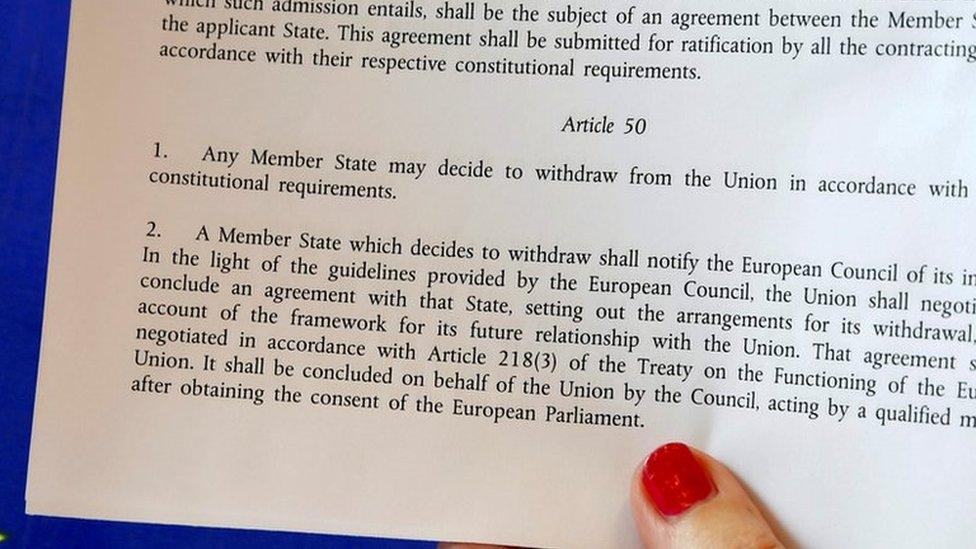
- Published3 December 2016
- Published24 January 2017
